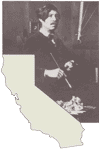![]()

Five Views: An Ethnic Historic Site Survey for California
MENU
Introduction
Mexican War
Post-Conquest
1900-1940
World War II
Chicano Movement
Future
Historic Sites
Selected References

A History of Mexican Americans in California:
HISTORIC SITES
El Centro Campesino
San Juan Bautista, San Benito County
El Centro Campesino Cultural in San Juan Bautista, San Benito County, is the home of the internationally acclaimed Teatro Campesino. Its director, Luis Valdez, is one of the nation's foremost contemporary playwrights. Founded in 1965 on the picket lines of the Great Delano Grape Strike and an integral part of the struggle to organize a national farmworkers' union, El Teatro Campesino is a vital force in the Chicano community. The Teatro has made invaluable contributions for the farmworkers' movement, to Chicano theater, to alternative theater, and to theater in California and the United States. Originating in Delano and later moving to a small center in Fresno, the Teatro had been in temporary quarters at San Juan Bautista. In 1978, the theater group purchased one acre on Fourth Street in San Juan Bautista, which now houses an old warehouse they plan to remodel into a major theater facility. San Juan Bautista, where they have also purchased 40 acres of land in the country, will be their permanent home.
Rooted in the contemporary Chicano struggle for self-determination, the Teatro Campesino is also rooted in Hispanic and Chicano theatrical traditions. These traditions include early religious and secular dramas performed in Mexico, Latin America, and California during the colonial period, and in Mexico and its provinces during the period of Mexican rule. They also include a people's or "popular" theater of the rambunctious, rollicking bands of carpas and maromeros, and the tandas de variedad. These latter two forms of popular theater were particularly strong in Chicano communities throughout California from the late nineteenth century to about the late 1940s.
In addition to drawing on Hispanic, Chicano, and other theatrical traditions, El Teatro Campesino has created traditions of its own as it has performed at labor camps, fields, urban centers, college campuses, and theaters in Latin America, the United States, and Europe. El Teatro Campesino has spawned an entire generation of teatros throughout the country, from El Teatro del Piojo in Washington State to El Teatro Bi-lingue in Texas.
Along with Luis Valdez, the Teatro's founder and director, most of the company's members were farmworkers and other working-class people. Their productions reflect Chicano reality, as well as their own experiences. Their initial audience and supporters were farmworkers, to whom the art of Valdez and the Teatro spoke their way of life. From 1965 to 1967, the Teatro Campesino performed its actos in the fields, during union meetings, and in protest marches. In the latter half of 1967, when it was clear that the United Farmworkers' Organizing Committee was going to survive and build a union, the Teatro severed its umbilical cord with the farmworkers' union and established an independent, non-profit cultural center in Fresno. The company formed El Centro Campesino Cultural, Inc., a non-profit theatrical company and production company.
The reception accorded the Teatro in labor camps and theaters is unparalleled in U.S. theater history. In 1969 and again in 1972, the Teatro toured Europe, where it portrayed the farmworker's struggle at the World Theater Festival in Nancy, France. In 1972, the company began to work on "La Carpa de Los Rasquachis," a summation of all the work that had come before. "La Carpa" was performed in Mexico City, and toured throughout the United States with runs in Seattle, New York, and Los Angeles in 1974. It was heralded as a major theatrical achievement.
"La Carpa" was at its fullest completion in 1976, when the Teatro launched another major European tour. "La Carpa," as an official bicentennial event, started at the Popular Comic Theater Festival in Nancy, France, and made its way through eight European countries.
The internationally known Teatro was awarded the Off-Broadway Award in 1968, and the Los Angeles Drama Critic's Award in 1969 and 1972. In 1972, Valdez created "Los Vendidos" for television. This production won several awards, among them a television Emmy. In January 1978, Valdez received the Rockefeller Foundation's Playwright in Residence Award, in connection with the production of his original play, "Loot Suit." He was commissioned to write and direct "Loot Suit" for production at the Mark Taper Forum of the Center Theater Group in Los Angeles. "Loot Suit," an immediate success at the Mark Taper, later had an extraordinarily lengthy and successful run at the Aquarius Theater. It was produced on Broadway in 1979 and made into a movie in 1981. In the spring of 1978, Valdez and the Teatro Campesino were presented with a resolution from the California Assembly which read, in part: "For numerous and valuable contributions to our cultural enrichment, Luis Valdez and El Teatro Campesino are deserving of public recognition and high commendations."
The Teatro Campesino's significance to Chicano history and culture are indisputable, as is its contribution to the culture of the state of California. The center in San Juan Bautista merits a special place in the history and culture of this state. The Teatro is currently located in a former packing house, built of wood in 1944. The 12,400-square-foot structure is situated on almost one acre of land.
NEXT> El Clamor Publico
Last Modified: Wed, Nov 17 2004 10:00:00 pm PDT
http://www.cr.nps.gov/history/online_books/5views/5views5h33.htm
![]()
 Top
Top